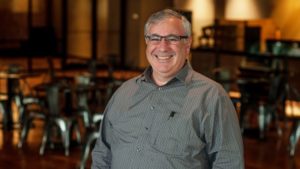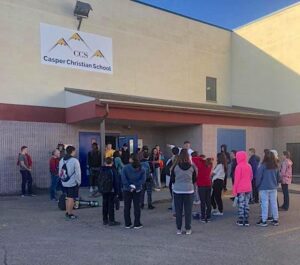Learning pods for underserved students earns South Carolina group national recognition
(Lisa Buie | reimaginED) – As the pandemic gripped the nation in the spring of 2020, American schools shut down and sent students home to finish the semester through online learning. The hastily…

(Lisa Buie | reimaginED) – As the pandemic gripped the nation in the spring of 2020, American schools shut down and sent students home to finish the semester through online learning. The hastily organized programs were thought to be short-term solutions.
But as the rising numbers of coronavirus cases ended administrators’ hopes of fully reopening in the fall, Allan Sherer, a member of the pastoral staff at an upstate South Carolina church, saw trouble ahead, especially for low-income minority students who had suffered academically in the spring.
The effort Sherer and his church made to educate low-income students over the course of the past two years received national recognition, placing as a semi-finalist for a $1 million STOP Award from Forbes Magazine and the Center for Education Reform.
Sherer’s North Hills Church, a non-denominational suburban congregation that draws 2,000 weekly worshipers, had sponsored academic summer camps for the past nine years. These camps focused on students in economically disadvantaged neighborhoods with the goal of preventing the annual summer learning slide. Now, with the pandemic sending students home permanently, Sherer feared these disadvantaged students would suffer learning losses so steep that they would never recover.
“We heard numerous stories of children who, when sent home with Chromebooks, never even turned those Chromebooks on,” said Sherer, who has overseen local and global outreach for 15 years at the church in Greenville, S.C. The Palmetto State’s sixth-largest city, Greenville has a population of 70,720 and includes former textile mill villages that sit one county away from BMW’s first North American manufacturing plant, which has brought more than 11,000 jobs and contributed other economic development to the state. Still, intergenerational poverty remains an issue.
After seeing stories about how affluent families were banding together and hiring teachers to deliver in-person instruction to their kids, Sherer immediately thought, “Why shouldn’t children who do not have the means for pods like this also be served?”

Allan Sherer, pastor of missions and outreach at North Hills Church and leader of pods project
Sherer’s vision quickly led to the start of Come Out Stronger, an initiative to offer learning pods in the most underserved communities of the city. North Hills already had relationships with churches in those communities, including Black churches, community organizations and individuals committed to making a difference.
Less than six weeks later, the group raised more than $300,000, identified more than 40 staff members, and set up 10 Covid-compliant locations, each of which was able to serve as many as 24 public school virtual learners.
Sherer said the initiative succeeded because of two major factors: an unprecedented awareness of the intractable gap minority and low-income families face; and a unifying belief that those who have the least opportunity receive an excellent education. The fact that so many community members stepped up in a state that flew the Confederate battle flag on the statehouse grounds until 2015 is a testament to the efforts made toward racial progress in recent years.
“As a faith-based institution leading the way in this initiative we found no resistance or even hesitancy among businesses, public school administrators, predominantly white or African-American churches, and other community stakeholders to coalesce around doing whatever it takes to make sure children were not irreparably left behind,” Sherer said.
In Judson Mill community, which derives its name from the former textile plant there, 76% of children live in homes below the poverty line, placing it in the lowest .3% of comparable communities in the United States. Organizers identified it as a great place for a pod, and the community came together to help make it and other pods a reality.
A regional gas station chain provided financial support while also providing breakfast each day. The lead counselor in the community’s Title I school went door-to-door to persuade parents to place their children in the pod. A Black church offered its building and recruited volunteers of color to help. A white Presbyterian church supplied “a phenomenal reading specialist” who tested each student at the beginning of the school year, laid out personalized plans for reading development and then re-tested students at the end to gauge progress.
“Every child experienced significant reading improvement over the course of the year,” Sherer said.
Each pod was designed to serve 12 children at one time, with one group attending Monday and Wednesday and the other attending Tuesday and Thursday. Students arrived each day at 7:45 a.m. Trained staff helped children log into their school e-learning platform and stay on task with their work. The pods also provided tutoring, structure, snacks, and recreation. Most ended at 2 p.m. Each pod had a budget of $25,000.
The biggest challenge, Sherer said, was the uneven and inconsistent delivery of virtual learning.
For example, one first-grader was expected to log into four different learning platforms to complete her work. Each platform had its own log-in routine and its own method of completing and uploading work.
“This child lives with her grandmother, who cares for three other primary-age children,” Sherer said. “The challenge of navigating these platforms was immense.”
Sherer said establishing standard performance metrics also proved difficult.
“Because of the chaotic nature of the school year, with schedules shifting and children at times coming in and out of our pods it was not feasible to create an evidence-based measure of our success,” he said. “Anecdotally, we have dozens and dozens of stories of children who had never been successful in school who made the A-B honor roll.”
A few examples of that success can be found in the personal stories shared by staff on a video.
One student, described as a “quiet hoodie kid” who had nothing to say, came from a single-parent home and claimed affiliation with a local gang. His grades were all failing.
“We began to speak to him and love him and tell him who he could be,” said staff member Miriam Burgess. She said being around her son, who works in the pod, offered the student a positive male role model.
Within a couple of weeks, his “F’s” became “B’s” and “A’s” and he started talking.
“Now he runs through the pod like he owns it,” Burgess said. The boy’s mother told Burgess that he renounced his gang affiliation and “his whole demeanor is different.”
When another student joined one of the pods, he had been to class only four times since the beginning of the pandemic. He had forgotten how to read, did not know his math facts, and could not remember the order of the alphabet.
“He has gone from reading 35 words per minute to 102 words per minute,” said pod staffer Brittany Meilinger.
Then there were the three siblings who were in the custody of grandparents who also were raising a set of kindergarten twin siblings.
“Their grandmother had no hope of keeping up with all five children and their assignments,” pod staffer J.P. Camp said. “The pod has been life-changing for this family.”
Success stories like those earned the project a place on the list of 20 semi-finalists for the STOP Award. Sponsored by the Center for Education Reform and Forbes, it awarded a $1 million prize to an education provider, exceptional group of people, or organization that demonstrated accomplishment during the coronavirus pandemic by providing an education experience that was “Sustainable, Transformational, Outstanding, and Permissionless.”
Despite the success, Sherer’s pandemic pods ended when local schools reopened in August 2021. Although the pods were closed, church volunteers continued their work in education, logging more than 400 tutoring hours at local public schools so far this year.
Sherer said the experience offered valuable insights about the future of education and inspired the Greenville pod organizers to think even bigger.
The coalition is now working to open a network of private, hybrid, community-based schools that will serve the poorest regions of South Carolina.
“These smaller networks have the potential to drive a new era of innovation. We are re-imagining the entire in-person learning experience, and our partners are lining up,” Sherer said.



